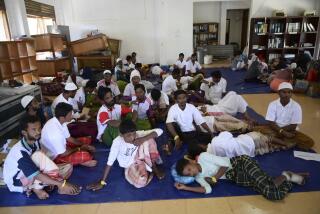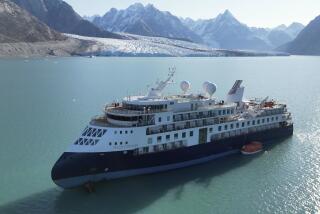Refugee Ship Remains in Limbo Off Australia
- Share via
CHRISTMAS ISLAND, Australia — Caught in diplomatic cross-fire from three nations and international aid agencies, hundreds of asylum seekers began their fifth day today on the deck of a Norwegian cargo ship off a remote tropical Australian island.
Their fate remained uncertain as Australian troops stood watch. The soldiers have been ordered to prevent the refugees from jumping overboard and to bar the ship from docking.
Australian Prime Minister John Howard told U.N. Secretary-General Kofi Annan by telephone that he would not allow the vessel to drop off its 460 passengers, and he is demanding that the freighter Tampa leave Australian waters.
Howard’s hard-line stance has been met with international criticism, but it appears to have gained him popularity at home as Australia prepares for a general election this year. Many Australians want growing illegal immigration stopped, polls show.
The Tampa rescued the refugees, who are mostly from Afghanistan, from a sinking Indonesian ferry in the Indian Ocean late Sunday or early Monday. It headed for Christmas Island after some of those rescued threatened to kill themselves or attack the crew.
Indonesia, Norway and international aid agencies want Australia to take in the refugees.
Today, New Zealand Prime Minister Helen Clark said her nation could offer haven to some of the asylum seekers, but only if other nations did the same. She would not specify how many people New Zealand might accept.
Later, the acting foreign minister in East Timor, Jose Ramos-Horta, said the territory would be happy to house the refugees if the United Nations paid all associated costs and they did not stay too long. It was not immediately clear whether the offer would be accepted.
Some fear that violence could soon flare on the ship if the crisis is not resolved.
“The people on board will become increasingly agitated, and the ship’s captain knows he cannot stay there forever,” said Michael McKinley, an analyst at Australian National University.
More to Read
Sign up for Essential California
The most important California stories and recommendations in your inbox every morning.
You may occasionally receive promotional content from the Los Angeles Times.










